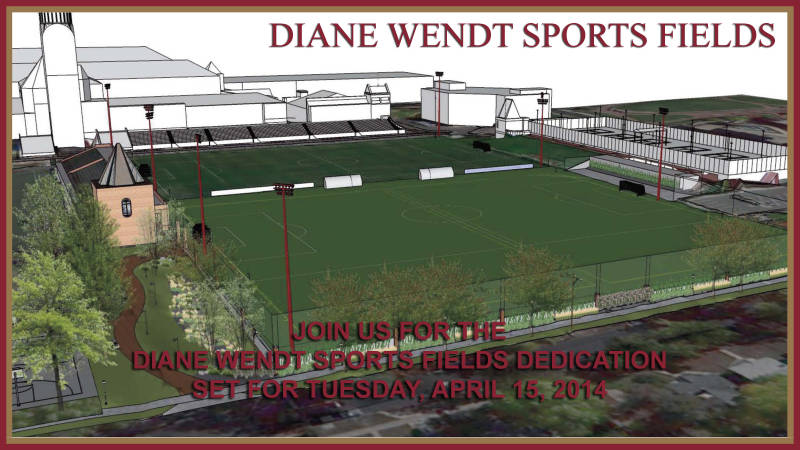DU’s Division of Athletics and Recreation recently announced the grand opening of the Diane Wendt Sports Fields, with a dedication ceremony scheduled on the fields for Tuesday, April 15 at 11 a.m. The fields are located off High Street and Jewell Avenue.
According to the Division of Athletics and Recreation, Wendt began DU’s intercollegiate women’s athletics program in 1974 when she was named the first Director of Women’s Athletics, and she has been recognized both locally and nationally with awards such as the Sportswomen of Colorado Leadership Award, Sportswomen of Colorado Hall of Fame and the National Association of Collegiate Women Administrators Outstanding Administrator for NCAA Division I AAA institutions. According to Senior Associate Athletic Director for External Relations Jeffrey Howard, the university’s lead donor for the fields project, DU Chair Emerita Joy Burns requested for the fields to be in Wendt’s name.
According to Allan Wilson, assistant director of facilities management, the field expansion was envisioned as part of the original design for the Ritchie Center, its design intended to expand playing field opportunities. While the project was started last April, it was delayed by the city and county of Denver on the grounds of a lighting discrepancy.
According to Wilson, Denver city code requires a maintenance of two foot-candles of lighting on the field’s property line, but with the project design’s requirement to put additional pedestrian lights in, the combination of the sports and pedestrian lights would increase the foot candle readings up to 2.7 foot candles, which the city objected to. The city of Denver delayed the project while DU figured out ways to address the issue, which delayed the university’s overall permitting process.
Colorado’s weather proved to be another setback.
“We planned to open this field last October,” said Wilson. The attempt to turf the field was cut short at some point in October or November because the process of installing the synthetic field was entirely temperature dependent.
However, Wilson discussed a number of advantages of synthetic turf over grass, including not needing to water the field and the university’s ability to program more hours of play on the field than ever before.
“The only way you keep a successful grass field is the number of rest hours you give it, so this allows us to run it until 10 o’clock at night with no effect at all. Student athletes can practice on it, we can put all the teams out there—it’s a game changer in some ways for what we’re doing,” said Wilson.
According to Associate Vice Chancellor for Recreation and Ritchie Center Operations Stuart Halsall, outdoor facilities primarily run from 7 a.m. through 10 p.m., and while the main use of the fields will be be for DU’s NCAA teams, especially soccer, club and intramural sports teams will be permitted to practice on it as well. The university is going to program time for students to use the fields in open format, in addition to providing space for summer camps which request it.
DU Men’s Club Soccer President Alex Procter, a second-year doctoral clinical psychology student, says the fields will provide his team with an opportunity to gain more exposure within the DU community, as well as take a great deal of financial burden off of them in terms of having to pay extra travel expenses.
“I’m very excited,” said Procter. “Not having a field that we could host our own home games on last year made it a very difficult season and involved a great deal of traveling and inconvenience for our team.”
According to Wilson, a number of separate contractors made the construction of Diane Wendt Sports Fields possible. American Civil Constructors can be attributed to the site work, Desso Sports Systems provided the sports turf, 1st Turf Inc. did the field installation, Musco Lighting provided the sports lighting, and The Davis Partnership is the Architect of Record for the project as a whole.











